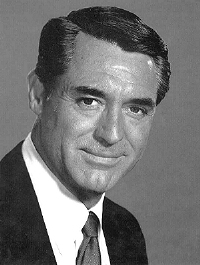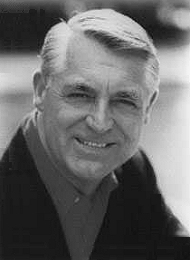 Possessing an exquisitely charming voice, dashing good looks, and rakish nonchalance, Cary Grant was the epitome of sophistication; yet he never came acros as effete or snobbish. Born Archibald Leach in Bristol, England in 1904, the future actor lived in extreme poverty, scraping for a living like a character in a Dickens novel. While a teenager, he joined an acrobatic act and came to America with them in 1920. He returned to England in 1923 and broke into the theater, playing modest roles in musical comedies. Spotted on the London stage, he was hired for an Oscar Hammerstein musical on Broadway called Golden Dawn.
Possessing an exquisitely charming voice, dashing good looks, and rakish nonchalance, Cary Grant was the epitome of sophistication; yet he never came acros as effete or snobbish. Born Archibald Leach in Bristol, England in 1904, the future actor lived in extreme poverty, scraping for a living like a character in a Dickens novel. While a teenager, he joined an acrobatic act and came to America with them in 1920. He returned to England in 1923 and broke into the theater, playing modest roles in musical comedies. Spotted on the London stage, he was hired for an Oscar Hammerstein musical on Broadway called Golden Dawn.
With the advent of sound motion pictures, Grant saw an opportunity to make big money. He went to Hollywood but managed only to get a job at Paramount feeding lines to an actresses who were being screen-tested. But eventually Grant was discovered; his starting salary was $450 per week. His first film was a musical, This Is the Night (1932), in which he had a modest role. In a string of films he had supporting parts, including the heavy who nearly destroys Marlene Dietrich in Blonde Venus (1932) and Mae West's foil in She Done Him Wrong (1933) and I'm No Angel (1933).
1936 was the year that Grant suddenly began to shine at the box office. The movie was Sylvia Scarlett; his costar was Katharine Hepburn; and the director was George Cukor. Grant worked with Hollywood's most inspired directors. As a consequence, the actor starred in a substantial number of top-noch movies. Grant appeared in Howard Hawks' wonderful screwball comedies Bringing Up Baby (1938) again with Katharine Hepburn, His Girl Friday (1940), I Was a Male War Bride (1949), and Monkey Business (1952). He also distinguished himself in a Hawks drama, Only Angels Have Wings (1939).
 When it came to drama, though, Grant was at his best in the films of Alfred Hitchcock, appearing in some of the master's best films, Suspicion (1941) with Joan Fontaine, Notorious (1946) co-starring Ingred Bergman, To Catch a Thief (1955) opposite Grace Kelly, and North by Northwest (1959) with Eva Marie Saint.
When it came to drama, though, Grant was at his best in the films of Alfred Hitchcock, appearing in some of the master's best films, Suspicion (1941) with Joan Fontaine, Notorious (1946) co-starring Ingred Bergman, To Catch a Thief (1955) opposite Grace Kelly, and North by Northwest (1959) with Eva Marie Saint.
Grant worked with other great directors as well, such as George Stevens (Gunga Din, 1939, and Talk of the Town, 1942), George Cukor (Holiday, 1938, and The Philadelphia Story, 1940, with Hepburn and James Stewart), Leo McCarey (The Awful Truth, 1937, and An Affair to Remember, 1957), and Frank Capra (Arsenic and Old Lace, 1944).
In 1953-54, after one mediocre film, Dream Wife (1953), he dasappeared from movie screens for nearly two years; it was generally assumed that none of the studios wanted a 50-year-old leading man (despite his youthful appearance). But the real reason he was absent from movie screens for two years had nothing to do with his lack of appeal: he had agreed to star in two films, but both deals fell through because of Grant's own ambivalence about the parts. The movies he was supposed to have appeared in were Sabrina (1954) and A Star is Born (1954).
Grant remained immensely popular throughout the late 1950s, and well into the 1960s, in such films as Indiscreet (1958) with Ingrid Bergman, Houseboat (1958) co-starring Sophia Loren, Charade (1963) opposite Audrey Hepburn, and Father Goose (1964). His last film, Walk, Don't Run (1966), was a money-maker. But Grant was offered the directorship of the Faberge cosmetics company, and he opted to leave his movie career while he was still on top. Somehow, in all his years in Hollywood, Grant had never received an Oscar, but the academy belatedly rectified that error by presenting the actor with a special award "for his unique mastery of the art of screen acting." Grant died in 1986.
--SCOTT & BARBARA SIEGEL, from
The Encyclopedia of Hollywood.